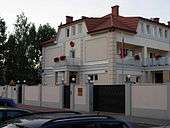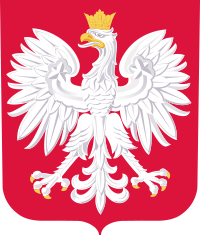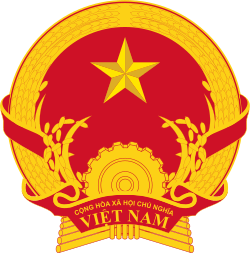Poland–Vietnam relations
Poland–Vietnam relations refers to the current and historical relations between Poland and Vietnam. Poland has an embassy in Hanoi and Vietnam has an embassy in Warsaw.
 | |
Poland |
Vietnam |
|---|---|
The relationship is characterized special due to historical commons although they are not close geographically. Poland and Vietnam both have long historical struggles against foreign invaders, mostly from Russia and China, which was embraced from a Vietnamese poem My dear, Poland[1] of Vietnamese poet Tố Hữu who had visited Poland once in his life. Although both operate two different political systems, as Poland is a post-communist free-market democratic republic, while Vietnam is an one-party communist authoritarian regime embarking market capitalism, relationship is still going excellent.
History

While two countries have little connection due to distinct geographical position, two countries nonetheless share a similar parallel of their histories, respectively: they have some of the longest and oldest histories in Europe and Asia. Both Poland and Vietnam were accredited for having defeated two powerful empires in their respective histories, the Ottoman and Mongol empires and saved each continents from the threats of these empires. Both also contributed some of the most popular, charismatic and revered figures in their respective histories: such as John III Sobieski, Józef Piłsudski, Józef Poniatowski, Witold Pilecki, Tadeusz Kościuszko, Casimir Pulaski, Witold Urbanowicz, Pope John Paul II for Poland; and Ngô Quyền, Trần Hưng Đạo, Võ Nguyên Giáp, Phan Bội Châu, Trưng Sisters, Nguyễn An, Lý Long Tường for Vietnam. Some of these figures are also revered outside both nations like Urbanowicz in Britain, Pulaski and Kościuszko for the U.S.; to Taksin for Thailand, Lý Long Tường for Korea and Nguyễn An for China. In the 17th century, Polish Jesuit missionary Wojciech Męciński visited Vietnam.[2]
Both two countries also share similarities over brutal treatments by foreign powers. In their long-historical struggles for independence, the Poles and Vietnamese both had to fought many powerful invaders, notably and majority, Russia and China, and often suffered much destructions. Both were also occupied by Nazi Germany and Soviet Union for Poland; Vichy France and Japanese Empire for Vietnam in the World War II, and were brutal victims of massacres launched by both these imperial forces; both also launched their own uprising to overthrow the brutal rules of Nazi German (Warsaw Uprising) and Imperial Japanese (August Revolution) with very limited helps from foreign Allies. Vietnam received great level of sympathy by Polish co-workers when they arrived to North Vietnam at 1960s due to their historical similarities; and Vietnamese immigrants to Poland also perceived Poland with a similar manner owning by Poland's history. When Vietnam was under subject of global condemnations and embargoes led by the United States and China over its war of Cambodia against Khmer Rouge, Poland, both the Government and anti-communist Solidarity movement, was one of the few nations to show solidarity with Vietnamese cause of war, an act that contributed to the later Third Polish Republic, at 1990s, to deploy troops to Cambodia under UN mission helping to stabilize Cambodia.[3]
In 1946, the future founder of Israel, a Polish Jew, David Ben-Gurion, met Hồ Chí Minh in Paris. His desire of establishing Israel and the historical impression from Ho to Poland was considered as the first unofficial tie between Vietnam and Poland.
Official diplomatic relations were established in 1950.[4] Janusz Lewandowski, representative of Polish delegation during the Geneva Accords at 1954, had protested the idea of separating Vietnam into two parts that proposed by the Government of newly-established People's Republic of China. To monitor the Geneva Accords, the International Control Commission (ICC) consisting of diplomats and soldiers from Poland, India and Canada was set up. The chairman of the ICC was always Indian while the Canadians were expected to support South Vietnam while the Poles were expected to support North Vietnam. In practice, the ICC did not work as expected with the Indian delegation often taking a more pro-North position than the Polish delegation who contrary to expectations proved to be more neutral.[5] Poland–Vietnam relations grew from the 1950s and 1980s student exchange programs, during which time both Poland and Vietnam were socialist republics under the grasp of the Soviet Union.[6][7] Both states were members of Comecon.
During the Vietnam War, Polish diplomats in North Vietnam collaborated with Italian diplomats in South Vietnam in order to seek peace and end the Vietnam War. The first effort was the "Maneli Affair" of 1963 named after the Polish commissioner on the ICC, Mieczysław Maneli. The "Maneli Affair" involved a proposal to end the war and ultimately set up a federation of North Vietnam and South Vietnam.[8] The second effort of 1966 was known as Operation Marigold. In Marigold, Janusz Lewandowski of the ICC met with the American ambassador to South Vietnam, Henry Cabot Lodge Jr., presenting an offer on behalf of North Vietnam to open peace talks provided the American stopped bombing North Vietnam first.
Polish Catholic influence in Vietnam
Throughout history of their relations, Poland had played, both unofficial and official role, on the growth and buildup of Roman Catholicism in Vietnam; since Roman Catholicism is the major religion in Poland. In 17th century, Polish Catholic Jesuit, Wojciech Męciński, visited Vietnam in a tour through Asia, and had documented about Vietnam as the first Polish official record of the country.[2]
Pope John Paul II, who was of Polish descent, had canonized all Vietnamese Catholics died from 1533 to protect Christianity as Vietnamese Martyrs in 1988.[9] The Polish Pope opted an open opportunity to establish relations with Vietnam; and had recognized the importance of Our Lady of La Vang, a Marian apparition in La Vang. He had also expressed desire to rebuild the La Vang Basilica in commemoration of the 200th anniversary of the first vision.[10] His message was instrumental, leading to the Government of Vietnam to acknowledge the importance of La Vang in Christian history of Vietnam.[11] The Polish Pope remained a revered figure among Vietnamese, both Catholics and non-Catholics, even when he died in 2005. The Polish Pope was also seen as having laid the framework to normalization of relations between the Holy See and Vietnam
Archbishop Marek Zalewski, who is the second Vatican non-residential representative to Vietnam, is from Poland.[12][13] He played a minor role, yet facilitated an unofficial link on the ongoing normalization between Holy See–Vietnam relations,[14] which was seen with the direct result of Vatican's decision to establish a permanent representative in Vietnam and accepted by the Vietnamese regime,[15] moving further to possible future establishment of official tie between two entities and lax of suppression on Catholicism in Vietnam by the Vietnamese regime.[16]
Cultural relations
The 10th-Anniversary Stadium has been called the center of the Vietnamese-Polish community.[17] The Vietnamese community is also served by a number of non-governmental organizations, run by the community itself.[18]
The Vietnamese-Polish High School in Hanoi was named in honor of relationship between Vietnam and Poland. Also in Hanoi, the Marie Curie High School was named in honor of the famous Polish woman scientist. There is also a statue of Kazimierz Kwiatkowski, who helped revive the city of Hội An, in the same city.[19]
State visits
From Poland [20]
- President of Poland in 1999
- Prime Minister of Poland in 2005
- President Andrzej Duda's visit to Vietnam in 2017[21]
From Vietnam [20]
- Prime Minister of Vietnam in 1997
- President of Vietnam in 2003
- Prime Minister in 2007
Development assistance
In 2015, Poland offered Vietnam 250 million Euros of development assistance.[4]
Migration
There has been significant migration of Vietnamese people to Poland estimated to be between 30,000-40,000 forming the largest non European migrant community in Poland.
Following the Polish transition to a capitalist economy in 1990, and the reforms of Vietnam at 1986, Poland became a more attractive immigration destination for the Vietnamese people, in particular, small entrepreneurs; this triggered a second, larger wave of Vietnamese immigrants to Poland.[7][22] Many began as vendors in the open air market bazaar at the 10th-Anniversary Stadium selling clothes or cheap food; as of 2005, there were between 1,100 and 1,200 Vietnamese-owned stands in the area.[23][24] As of 2002 in Warsaw there were an estimated 500 Vietnamese restaurants, mostly serving fast food.[23]
Books and articles
- Karnow, Stanley Vietnam: A History, New York: Viking, 1983, ISBN 0670746045
- Gnoinska, Margaret "Poland and Vietnam, 1963: New Evidence on Secret Communist Diplomacy and the "Maneli Affair"" pages 2-83 from Cold War International History Project Working Paper 45 March 2005
- Thakur, Ramesh "Peacekeeping and Foreign Policy: Canada, India and the International Commission in Vietnam, 1954-1965" pages 125-153 from British Journal of International Studies Volume 6, Issue 2, July 1980
References
- My dear, Poland, Le Van Hieu (in Vietnamese)
- http://misjejezuici.blogspot.com/2012/07/wojciech-mecinski.html
- https://polandin.com/39483727/polish-un-military-mission-to-have-a-documentary
- http://www.vir.com.vn/poland-vietnam-65-years-of-friendship-and-cooperation.html
- Thakur 1980, p. 129
- Grzymala-Kazlowska 2002, p. 6
- Nowicka, p.216-217
- Karnow 1983, p. 292
- "Catholic Forum". Archived from the original on 2007-04-29. Retrieved 2019-04-24.
- "Message of Pope John Paul II for the Conclusion of the Marian Year in La Vang, Viet Nam". Our Lady of La Salette and Saint Joseph Catholic Church. Archived from the original on 2003-09-01. Retrieved 9/11/15. Check date values in:
|accessdate=(help) - https://w2.vatican.va/content/john-paul-ii/en/letters/1999/documents/hf_jp-ii_let_19990716_madonna-la-vang.html
- http://www.catholic-hierarchy.org/bishop/bzalew.html
- https://www.vaticannews.va/en/pope/news/2018-05/pope-francis-nuncio-singapore-vietnam-zalewski.html
- http://www.asianews.it/news-en/Mgr-Marek-Zalewski%E2%80%99s-new-task-as-new-nuncio-in-Hanoi-44050.html
- https://zenit.org/articles/seventh-meeting-of-the-vietnam-holy-see-joint-working-group/
- https://www.romereports.com/en/2018/12/20/holy-see-to-have-permanent-representative-in-vietnam/
- Grzymala-Kazlowska 2002, pp. 7–8
- Grzymala-Kazlowska 2002, p. 8
- https://vietnamnews.vn/life-style/373104/viet-nam-pays-tribute-to-polish-architect-kazik.html
- http://www.vietnamembassy-poland.org/en/nr070521165956/news_object_view?newsPath=/vnemb.vn/cn_vakv/euro/nr040819110934/ns070919142436 Archived 2015-11-17 at the Wayback Machine
- "Polish President begins state visit to Vietnam". VOV news, 27 November 2017
- Grzymala-Kazlowska 2002, pp. 6–7
- Grzymala-Kazlowska 2002, p. 7
- Bartoszewicz, Dariusz; Kwaśniewski, Tomasz (2005-10-06), "Wietnamczycy – czym zajmują się w Warszawie", Gazeta Stołeczna, retrieved 2009-06-02 (in Polish)

